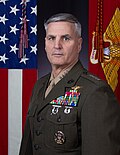| Assistant Commandant of the Marine Corps | |
|---|---|
 Emblem of the Marine Corps | |
 Flag of a Marine Corps general | |
| Abbreviation | ACMC |
| Reports to | Commandant of the Marine Corps |
| Appointer | The president with Senate advice and consent |
| Formation | April 29, 1911 |
| First holder | Eli K. Cole |
The assistant commandant of the Marine Corps (ACMC) is the second highest-ranking officer in the United States Marine Corps, and serves as a deputy for the commandant of the Marine Corps (CMC). Before 1946, the title was known as the assistant to the commandant.
Contents
- List of appointees
- Assistants to the commandant of the Marine Corps
- Assistant commandants of the Marine Corps
- Timeline
- See also
- References
The assistant commandant is nominated for appointment by the president and must be confirmed via majority vote by the Senate. If the commandant is absent or is unable to perform his duties, then the assistant commandant assumes the duties and responsibilities of the commandant. For this reason, the assistant commandant is appointed to a rank equal to the sitting commandant; since 1971, each assistant commandant has been, by statute, a four-star general, making it the most common rank held among marines serving this position. Additionally, he may perform other duties that the CMC assigns to him. [1] Historically, the assistant commandant has served for two to three years. In recent decades, the assistant commandant has frequently been a Marine aviator. James F. Amos was the first aviator to serve as the assistant commandant and then be promoted to commandant.
The first marine to hold the billet as the "assistant to the commandant" was Eli K. Cole (Allen H. Turnage being the last), while Lemuel C. Shepherd Jr. was the first to hold it as the "assistant commandant".


























































